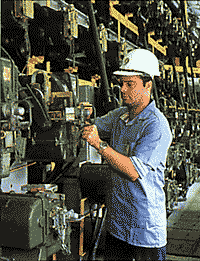The private sector admits that goods and services production as well as sales, had a recovery in the first six months of the year. A survey by Conindustria, reveals that 45.6% of the entrepreneurs perceive their economic situation as good.

The Central Bank of Venezuela (BCV) reported that the Gross National Product (GNP) of the manufacturing sector registered 37.9% growth in the first semester of the year, compared to the 22.3% drop for the same period in 2003. This reflects that the country reacted positively to the increase in oil income, that the international reserves stabilized, and that the demand for goods and services increased.
Although industry entrepreneurs still complain that currency exchange control does not grant freedom to international trade, and that restrictive policies could unleash inflation, they must admit that there are evident signs of economic recovery.
A survey by the Venezuelan Confederation of Industrials (Conindustria), indicates that the sector experienced a slight recovery during the second quarter of the current year.
The report says that, in average, industry businessmen perceive the current situation of their enterprises as moderately good compared to that during the same period in 2003; a mildly better perception compared to that of the previous quarter.
According to the report by Conindustria (which supported the 2002 entrepreneurial strike against Chávez’ government), “Most entrepreneurs surveyed consider the situation is still fair but with a trend towards being good.”
The document claims that the sector of big industries is more optimistic than that of the medium and small industries, since 45.6% of those interviewed in the former sector, perceive their situation as good.
Most industrial sectors, except for the wood industry, registered recovery in production. Conindustria figures indicate that 40.58% of the food processing industries have increased their production, and so have 53.85% of the paper manufacturing industries. Likewise, 54.55% of the metallic product factories have improved their situation. Textile and chemical industries have also raised their productive levels.


In the first semester of the year, factories had a greater volume of sales and purchase orders than they did last year, although there was a certain trend towards decrease due to disruptive factors like political uncertainty, in the face of the presidential recall referendum process.
Nevertheless, the interviewees affirmed that their production has been recovering consistently since the second quarter of 2003.
Employment in the manufacturing sector has been stable. Entrepreneurs indicate that the 260,000 jobs lost (out of a 467,519 total) in the last five years have not yet been recovered. “Although expectations among entrepreneurs in the face of the improvement in the production variables are moderate, the sector’s prospects of employment have been on the rise”, says the report.
The poll reveals that for 90% of the industrial entrepreneurs, the main factor hindering production increase is political uncertainty. Now that the referendum process is over, and thus the uncertainty factor that went along with it, everything indicates that production will increase considerably.
The second restrictive factor, according to 82% of the answers to the survey, is low demand, which shows that despite this last year’s recovery in the economic and in production, industries do not expect this accelerated growth rate to keep up. Why?. It’s something the report does not explain.
Published by Quantum, No 29
 Articles by this author
Articles by this author











Stay In Touch
Follow us on social networks
Subscribe to weekly newsletter